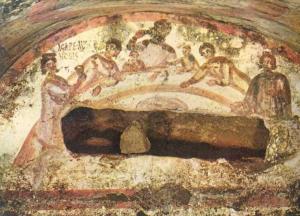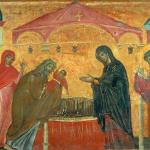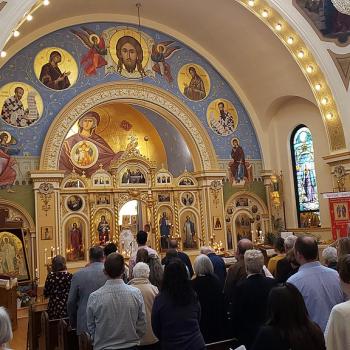
Talking about the last judgment, Jesus indicated that we shall learn that what we did to others, especially the least among us, we did to him: “And the King will answer them, `Truly, I say to you, as you did it to one of the least of these my brethren, you did it to me’” (Matt. 25:40 RSV). If we look, we shall find Jesus among the poor and needy, among the abused and outcast, among those who have been mistreated and ignored. If we cannot love them, if we will not speak up for them, if we will not be their voice and work for their justice, we will find ourselves rejecting Jesus. It is, after all, these people Jesus said we should look to in order to find him. He has identified himself with them. It should not be surprising, therefore, that in a parable, Jesus indicated it is these same people, these same outcasts, who will be called to rejoice with him in the great eschatological banquet:
He said also to the man who had invited him, “When you give a dinner or a banquet, do not invite your friends or your brothers or your kinsmen or rich neighbors, lest they also invite you in return, and you be repaid. But when you give a feast, invite the poor, the maimed, the lame, the blind, and you will be blessed, because they cannot repay you. You will be repaid at the resurrection of the just (Lk. 14:12-14 RSV)
The eucharistic banquet is an eschatological banquet. In Christ, the eschaton has been immanentized. With the eucharist, we receive Christ and all those he has associated himself with. Through the eucharist, we are made one with Christ, but only if we receive worthily. We must open ourselves to those who are with him and in him, the unjustly oppressed who have found themselves worn down from all the injustices they have endured. Like Job, they have experienced great trials and tribulations. Also, like Job, they find people make all kinds of excuses to justify indifference to them, to say that their problems, their suffering, must be their fault. However, unlike Job, many of them do not find earthly happiness. The only end to their grief is in their death. Because Jesus put his cause with them, he justifies them through his resurrection from the dead. Death is the end of their trials. Now with Jesus they can find their place in the kingdom of God. Jesus has called them to be with him, and through Jesus, they will find themselves vindicated by God.
If we want to receive Christ, if we want to receive him in communion, if we want to receive the eucharist, we must recognize we are partaking of Jesus in his stand with the poor and infirm, with those pressed down and attacked by the powers that be. When we receive communion, we are affirming Christ and his ways, including and especially in his promotion and lifting up of the outcasts of the world. Jesus was the ultimate outcast. He emptied himself all the way to the pit of hell, only to find himself taken in and accepted by those who had been cast out like him: tax collectors, prostitutes, drunkards, the infirm, the poor, that is, those society chose to ignore. If we want to find him, we must look to where he told us to find him. If we want him, we will find ourselves walking with him to those in need, proclaiming the great liberating Jubilee of the Lord:
And he came to Nazareth, where he had been brought up; and he went to the synagogue, as his custom was, on the sabbath day. And he stood up to read; and there was given to him the book of the prophet Isaiah. He opened the book and found the place where it was written, “The Spirit of the Lord is upon me, because he has anointed me to preach good news to the poor. He has sent me to proclaim release to the captives and recovering of sight to the blind, to set at liberty those who are oppressed, to proclaim the acceptable year of the Lord.” And he closed the book, and gave it back to the attendant, and sat down; and the eyes of all in the synagogue were fixed on him. And he began to say to them, “Today this scripture has been fulfilled in your hearing” (Lk. 4:16 – 21 RSV).
That is why, if we partake of the eucharist, if we let ourselves be joined to Christ, we must take on his mission and promote his liberating work across the world. If we do not, then we ourselves are partaking of the eucharist unworthily, as St. John Chrysostom warned:
“Wherefore whosoever shall eat this bread and drink the cup of the Lord unworthily, shall be guilty of the Body and the Blood of the Lord.”
Why so? Because he poured it out, and makes the thing appear a slaughter and no longer a sacrifice. Much therefore as they who then pierced Him, pierced Him not that they might drink but that they might shed His blood: so likewise does he that comes for it unworthily and reaps no profit thereby. Do you see how fearful he makes his discourse, and inveighs against them very exceedingly, signifying that if they are thus to drink, they partake unworthily of the elements ? For how can it be other than unworthily when it is he who neglects the hungry? Who besides overlooking him puts him to shame? Since if not giving to the poor casts one out of the kingdom, even though one should be a virgin; or rather, not giving liberally: (for even those virgins too had oil, only they had it not abundantly:) consider how great the evil will prove, to have wrought so many impieties? [1]
Why would it be unworthy? Because we resist the work of the Lord and his liberating fervor to help those in need. It Is unworthy because such communion is blasphemous, as the person who partakes of the eucharist looks down upon the people in which we find Jesus. This is why the eucharist is highly related to questions of justice, for Jesus is with the oppressed, and those who want to partake of Jesus for their salvation, those who want to receive him, must likewise stand with the oppressed..
Pope Benedict XVI, understanding the need to tie reception of the eucharist with social justice, made it clear that the church must continue to reflect upon and act upon this connection, lest people find themselves partaking unworthily:
The relationship between the eucharistic mystery and social commitment must be made explicit. The Eucharist is the sacrament of communion between brothers and sisters who allow themselves to be reconciled in Christ, who made of Jews and pagans one people, tearing down the wall of hostility which divided them (cf. Eph 2:14). Only this constant impulse towards reconciliation enables us to partake worthily of the Body and Blood of Christ (cf. Mt 5:23-24). In the memorial of his sacrifice, the Lord strengthens our fraternal communion and, in a particular way, urges those in conflict to hasten their reconciliation by opening themselves to dialogue and a commitment to justice. Certainly, the restoration of justice, reconciliation and forgiveness are the conditions for building true peace. The recognition of this fact leads to a determination to transform unjust structures and to restore respect for the dignity of all men and women, created in God’s image and likeness.[2]
Jesus is found in and with those who are poor and oppressed. The link between communion and justice is Jesus himself. He stands for those who need help. He is with them. He is one of them. His resurrection is their affirmation even as it is his. If we reject them, how can we properly commune with Christ? If we, however, find our hearts full of charity, seeking justice in the world, then, St. Albert explained, the eucharist will help us in accomplishing works of justice and mercy:
For this communion causes material assistance in works of mercy, since he who has resources freely supplies them so that he may receive an abundance of spiritual [goods] from the whole body in return for temporal [goods].[3]
If we truly open ourselves to Jesus, not only will our resolve by strengthened by our communion with him, we will find ourselves being more and more like him, suffering with those who suffer, and rejoicing with those who rejoice:
For it makes [us] have communion in the sufferings of the mystical body, since, as the Apostle says [1 Cor 12:26], “If one member suffers anything, all the members suffer with it; or, if one member glories, all the members rejoice with it.” Therefore, the suffering of one member flows through communion to the others through mercy and pity ; and from compassion of heart, words of consolation and the material assistance of the works of mercy and supports for infirmity flow in various ways from this communion into the members who are suffering; for by suffering together we are made like to the head of the body, because out of compassion he had for us, he gave himself over to much suffering, that he might aid us by its effects. [4]
When we see someone unjustly suffering from oppression, we find Jesus suffering and in need. And when we see Jesus in need, because we have joined ourselves with him, we will also find ourselves sharing in his lot and suffering with those who are suffering. Through Jesus, we will find ourselves to be one with the oppressed. Love joins us with them. And this is why Pope Francis pointed out that the “memorial” aspect of the eucharist itself connects with justice, because it connects with love, and love is nothing without others:
And the Church celebrates the Eucharist, she celebrates the memory of the Lord, the sacrifice of the Lord. Because the Church is a community of remembrance. Hence, in fidelity to the Lord’s command, she never ceases to say: “Do this in remembrance of me” (Lk 22:19). Generation after generation, throughout the world, she celebrates the mystery of the Bread of Life. She makes it present, truly real, and she gives it to us. Jesus asks us to share in his life, and through us he allows this gift to multiply in our world. We are not isolated individuals, separated from one another, but rather a people of remembrance, a remembrance ever renewed and ever shared with others.
A life of remembrance needs others. It demands exchange, encounter and a genuine solidarity capable of entering into the mindset of taking, blessing and giving. It demands the logic of love. [5]
If we love Jesus, we will follow him and keep his commandments, commandments which make it clear we are to love our neighbor as ourselves. How can we say we love them if we do not stand up for them when they are unjustly beaten down? How can we say we love them if we act against their interests for our own selfish desires? Truly, if we want to receive communion worthily, we will do so recognizing the needs of others, the needs of those Jesus said represent him to us, and we will do what we can for them.
If we truly want to receive the eucharist worthily instead of for our condemnation, we must promote the cause of Jesus. For if we want to receive him, we will receive him where he is at. And he has told us where we are to find him. Why, then, do so many of us ignore him and take communion unworthily?
[1] St. John Chrysostom, “Homilies on First Corinthians” in NPNF1(12): 161-2.
[2] Pope Benedict XVI, Sacramentum Caritatis. Vatican translation. ¶89.
[3] St. Albert the Great, On the Body and Blood of the Lord. Trans. Sr. Albert Marie Sumanski, OP (Washington, DC: CUA Press, 2017), 272.
[4] St. Albert the Great, On the Body and Blood of the Lord, 271.
[5] Pope Francis, “Homily at the Holy Mass in Christ the Redeemer Square” (7-9-2015).
Stay in touch! Like A Little Bit of Nothing on Facebook.
If you liked what you read, please consider sharing it with your friends and family!













